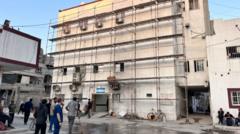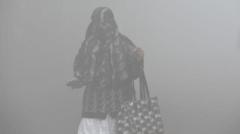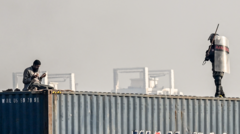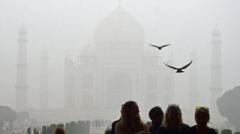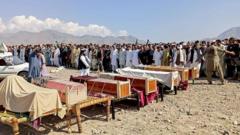In response to alarming air pollution levels, authorities in Pakistan's Punjab province have mandated significant restrictions aimed at safeguarding the health of its population.
Record Smog Crisis in Punjab, Pakistan: Authorities Take Urgent Action

Record Smog Crisis in Punjab, Pakistan: Authorities Take Urgent Action
As pollution reaches hazardous levels, measures are implemented to protect public health and reduce air quality risks in Punjab's major cities.
In Punjab, air quality has reached critical extremes, prompting the provincial government to issue directives affecting approximately 70 million residents. Marriyum Aurangzeb, a senior minister, highlighted the severity of the ongoing situation during a press briefing on Wednesday, urging citizens to minimize exposure to the hazardous environment.
The vibrant city of Lahore, housing around 13 million individuals, has registered unprecedented readings on the Air Quality Index (AQI), including a staggering record exceeding 1,000 on Sunday—marking the worst air quality ever reported in the region. The AQI above 301 falls within the hazardous range, warning of severe health risks, which include respiratory ailments and exacerbated pre-existing conditions. This recent surge in pollution has strained healthcare services, as confirmed by reports of over 900 hospital admissions for respiratory issues just this week.
Given these alarming statistics, the authorities have taken extensive measures that include closing primary and secondary schools, transitioning to online education until at least mid-November, and advising the workforce to remain home during severe air pollution episodes. This initiative signifies the largest public health intervention the region has noted regarding air quality concerns.
To further combat pollution, Punjab’s police have intensified efforts to curb the use of high-emission vehicles, leading to actions such as the impounding of over 500 polluting cars. Additional efforts involve the dismantling of numerous brick kilns contributing significantly to the smog crisis.
With unfavorable air quality expected to persist for at least another 10 days, officials emphasize public health precautions, recommending that residents wear face masks when outdoors and limit movements, thereby underscoring the critical intersection of environmental health and public policy in addressing air pollution in Punjab.
As pollution continues to pose a significant threat to the health and well-being of its residents, the unfolding situation in Punjab serves as a reminder of the urgent global challenge of air quality management and the necessity for comprehensive strategies to protect communities and safeguard environmental health.
The vibrant city of Lahore, housing around 13 million individuals, has registered unprecedented readings on the Air Quality Index (AQI), including a staggering record exceeding 1,000 on Sunday—marking the worst air quality ever reported in the region. The AQI above 301 falls within the hazardous range, warning of severe health risks, which include respiratory ailments and exacerbated pre-existing conditions. This recent surge in pollution has strained healthcare services, as confirmed by reports of over 900 hospital admissions for respiratory issues just this week.
Given these alarming statistics, the authorities have taken extensive measures that include closing primary and secondary schools, transitioning to online education until at least mid-November, and advising the workforce to remain home during severe air pollution episodes. This initiative signifies the largest public health intervention the region has noted regarding air quality concerns.
To further combat pollution, Punjab’s police have intensified efforts to curb the use of high-emission vehicles, leading to actions such as the impounding of over 500 polluting cars. Additional efforts involve the dismantling of numerous brick kilns contributing significantly to the smog crisis.
With unfavorable air quality expected to persist for at least another 10 days, officials emphasize public health precautions, recommending that residents wear face masks when outdoors and limit movements, thereby underscoring the critical intersection of environmental health and public policy in addressing air pollution in Punjab.
As pollution continues to pose a significant threat to the health and well-being of its residents, the unfolding situation in Punjab serves as a reminder of the urgent global challenge of air quality management and the necessity for comprehensive strategies to protect communities and safeguard environmental health.





